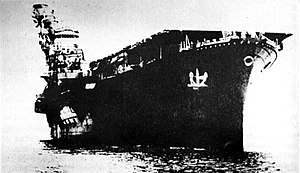Japanese aircraft carrier Hiyō

Hiyo at anchor
|
|
| History | |
|---|---|
|
|
|
| Name: | SS Izumo Maru |
| Owner: | Nippon Yusen Kaisha (Japan Mail Steamship Company) |
| Ordered: | Late 1938 |
| Builder: | Kawasaki Heavy Industries Shipyard, Kobe |
| Yard number: | 660 |
| Way number: | 4 |
| Laid down: | 30 November 1939 |
| Launched: | 24 June 1941 |
| Fate: | Sold to Imperial Japanese Navy, 10 February 1942 |
|
|
|
| Name: | Hiyō |
| Namesake: | Flying Hawk |
| Acquired: | 10 February 1941 |
| Commissioned: | 31 July 1942 |
| Struck: | 10 November 1944 |
| Fate: | Sunk, 20 June 1944 in the Battle of the Philippine Sea |
| General characteristics (as built) | |
| Class and type: | Hiyō-class aircraft carrier |
| Displacement: | 24,150 tonnes (23,770 long tons) (standard) |
| Length: | 220 m (721 ft 9 in) (o/a) |
| Beam: | 26.7 m (87 ft 7 in) |
| Draft: | 8.15 m (26 ft 9 in) |
| Installed power: |
|
| Propulsion: | 2 shafts; 2 geared steam turbine sets |
| Speed: | 25.5 knots (47.2 km/h; 29.3 mph) |
| Range: | 11,700 nmi (21,700 km; 13,500 mi) at 18 knots (33 km/h; 21 mph) |
| Complement: | 1,187–1,224 |
| Sensors and processing systems: |
1 × Type 2, Mark 2, Model 1 air search radar |
| Armament: |
|
| Armor: | |
| Aircraft carried: | 48–53 |
Hiyō (飛鷹 "Flying Hawk"?) was a Hiyō-class aircraft carrier of the Imperial Japanese Navy. Begun as the ocean liner Izumo Maru (出雲丸?) in 1939, she was purchased by the Navy Ministry in 1941 for conversion to an aircraft carrier. Completed shortly after the Battle of Midway in June 1942, she participated in the Guadalcanal Campaign in October and missed the Battle of the Santa Cruz Islands later that month because of an electrical generator fire. Her aircraft were disembarked several times and used from land bases in a number of battles in the South West Pacific. Hiyō was torpedoed in mid-1943 and spent three months under repair. She spent most of the next six months training and ferrying aircraft before returning to combat. She was sunk by a gasoline vapor explosion caused by an American torpedo hit during the Battle of the Philippine Sea in mid-1944.
The ship was ordered as the fast luxury passenger liner Izumo Maru by Nippon Yusen Kaisha (Japan Mail Steamship Company) in late 1938. In exchange for a 60% subsidy of her building costs by the Navy Ministry, she was designed to be converted to an aircraft carrier.
...
Wikipedia
